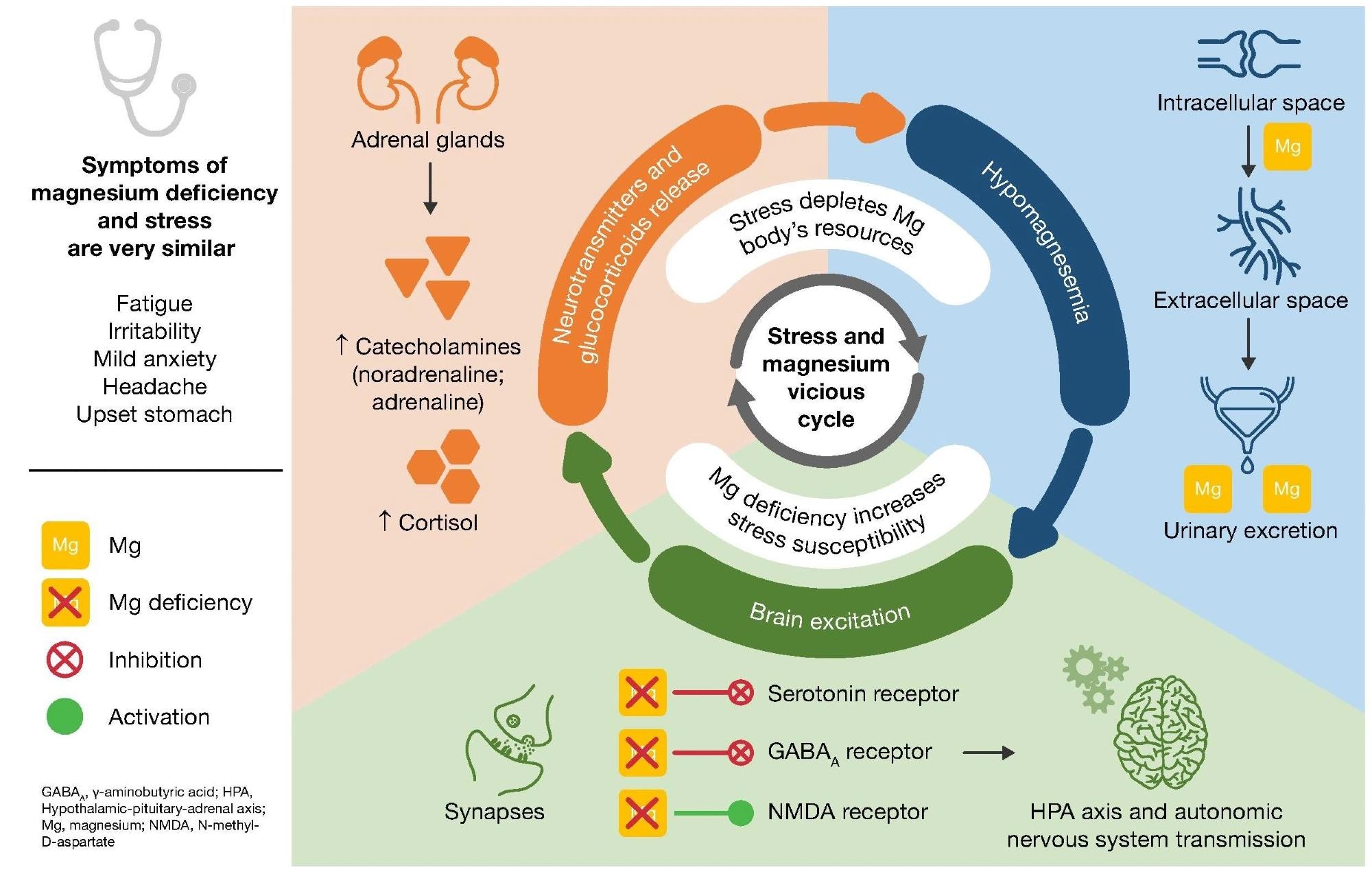Magnesium can enhance mood, support sleep, improve athletic performance, aid blood sugar control, and more. It’s available in supplements and in foods like nuts and leafy greens.
From helping regulate blood glucose to supporting physical performance, magnesium is vital for both brain and body function.
Although it occurs in many foods — from leafy vegetables to nuts, seeds, and legumes — a lot of people don’t meet their magnesium needs through diet alone.
Below are 12 research-backed benefits of magnesium and practical tips to raise your intake.
1. Participates in hundreds of biochemical processes
Magnesium is present throughout the body. Every cell contains this mineral and relies on it to work properly.
About 60% of the body’s magnesium is stored in bone, with the remainder located in muscle, soft tissues, and bodily fluids such as blood.
A major role of magnesium is serving as a cofactor — a helper molecule — for enzymes that carry out biochemical reactions. It’s required for more than 600 reactions in the body, including:
- Energy production: converting nutrients into usable energy
- Protein synthesis: building proteins from amino acids
- DNA and RNA maintenance: helping form and repair genetic material
- Muscle function: supporting contraction and relaxation of muscles
- Neural regulation: modulating neurotransmitters that relay signals across the brain and nervous system
Despite its importance, research indicates roughly half of U.S. adults consume less than the recommended daily magnesium amount.
SummaryMagnesium is essential for hundreds of chemical processes in the body, yet many people fall short of recommended intake levels.
2. May enhance exercise performance
Exercise can increase magnesium needs compared with rest, depending on the type and intensity of activity.
Magnesium assists with moving blood glucose into muscle cells and clearing lactate produced during exercise, which can reduce fatigue.
Research suggests magnesium supplementation may particularly benefit older adults and individuals who are deficient in this mineral.
In an older study of 2,570 women, higher magnesium intake was associated with greater muscle mass and strength.
In a 2019 trial, professional male cyclists who took 400 mg of magnesium daily for three weeks experienced better muscle recovery and less muscle damage after a demanding race than those taking a placebo.
However, findings are inconsistent: some studies find no benefit for athletes or active people who already have adequate magnesium status.
SummaryMagnesium supplementation has been shown to improve exercise outcomes in some studies, though results vary.
3. May help with depression
Magnesium is important for brain health and mood regulation; low magnesium levels have been associated with higher depression risk.
A 2020 review proposed that stress can deplete magnesium, increasing vulnerability to stress-related mood disorders.

Supplementing with magnesium may reduce depressive symptoms in some cases.
In one small eight-week trial, 500 mg of magnesium daily significantly improved depressive symptoms in people who were deficient.
Another six-week study in 126 participants found that 248 mg of magnesium per day reduced symptoms of depression and anxiety regardless of baseline magnesium status.
SummaryMagnesium deficiency may be linked to depression, and supplementation might help alleviate depressive symptoms.
4. May support healthy blood sugar control
Studies indicate that nearly half of people with type 2 diabetes have low blood magnesium, which can impair glucose regulation.
Additionally, higher dietary magnesium intake is associated with a lower risk of developing type 2 diabetes.
Reviews suggest magnesium supplements can improve insulin sensitivity, an important factor in blood sugar management.
Other analyses report improved glucose control and insulin sensitivity in individuals at risk for type 2 diabetes after magnesium supplementation.
SummaryMagnesium supplementation may improve blood sugar control, insulin sensitivity, and other metabolic risk factors linked to type 2 diabetes.
5. May benefit heart health
Magnesium plays a significant part in maintaining cardiovascular health.
A 2021 review found that magnesium supplements can reduce high blood pressure, a risk factor for heart disease.
Another review associated higher magnesium intake with lower risks of heart disease, stroke, and hypertension.
One synthesis of studies reported that magnesium supplements improved several heart disease risk markers — such as triglycerides, LDL cholesterol, HDL cholesterol, and systolic blood pressure — especially in people who were deficient.
Nonetheless, other research has reported no effect of magnesium on cholesterol or triglyceride levels, so more investigation is necessary.
SummaryMagnesium may help lower blood pressure and improve some cardiovascular risk factors, but evidence is mixed and further study is required.
6. Has anti-inflammatory properties
Insufficient magnesium intake is associated with higher inflammation, which contributes to aging and chronic disease.
A review of 11 trials concluded that magnesium supplements reduced levels of C-reactive protein (CRP), an inflammation marker, in people with chronic inflammation.
Other studies report similar reductions in CRP and inflammatory cytokines like interleukin-6 following magnesium supplementation.
Some research also links magnesium deficiency to increased oxidative stress, which is tied to inflammation.
SummaryMagnesium appears to help reduce inflammation, lowering markers such as CRP and interleukin-6.
7. May reduce migraine frequency and severity
Migraines are painful headaches often accompanied by nausea, vomiting, and light or sound sensitivity.
Some evidence suggests people with migraines are more likely to have low magnesium levels.
Several studies indicate magnesium supplements may both prevent and treat migraine attacks.
In one older trial, 1 gram of magnesium provided faster and more effective relief from acute migraine attacks than a commonly used medication.
Increasing dietary magnesium may also help lower migraine severity.
SummaryPeople with migraines may have lower magnesium; supplementing has shown promise for reducing migraine attacks in some studies.
8. May ease PMS symptoms
Premenstrual syndrome (PMS) commonly affects people of reproductive age, causing bloating, cramps, fatigue, and mood changes.
Some studies indicate magnesium supplementation can help relieve PMS symptoms as well as related issues like menstrual cramps and migraine.
Magnesium levels can vary across the menstrual cycle, and deficiency may worsen PMS; supplementation might reduce symptom severity.
One trial found that 300 mg of magnesium per day reduced bloating, depression, and anxiety among college students with PMS compared with controls.
Still, higher-quality, recent studies are needed to confirm whether magnesium helps independently of baseline levels.
SummarySome evidence supports magnesium’s role in improving PMS symptoms, but more rigorous research is needed.
9. May protect bone health
Magnesium is vital for bone strength and preventing bone loss; roughly 50–60% of the body’s magnesium resides in bone.
Several studies link low magnesium to higher osteoporosis risk and weaker bones.
A three-year study of 358 people on hemodialysis found that those with the lowest magnesium intake had three times more fractures than those with the highest intake.
Additionally, a review of 12 studies associated higher magnesium intake with greater bone mineral density in the hip and femoral neck, regions prone to fracture.
SummaryMagnesium is important for bone health, and higher intake has been linked to lower risk of osteoporosis, fractures, and bone loss in some studies.
10. May improve sleep quality
Magnesium supplements are often used to address sleep problems like insomnia.
Magnesium helps regulate neurotransmitters involved in sleep, such as gamma-aminobutyric acid (GABA).
One review of older adults with insomnia found that magnesium reduced time to fall asleep by about 17 minutes on average.
Another large study of nearly 4,000 adults associated higher magnesium intake with better sleep duration and quality.
Research also links greater magnesium intake in women with a lower chance of daytime sleepiness.
SummaryIncreasing magnesium through diet or supplements may help with certain sleep difficulties and enhance sleep quality.
11. May reduce anxiety symptoms
Some evidence indicates magnesium can help prevent and treat anxiety.
For instance, a study of 3,172 Iranian adults found higher magnesium intake was linked to lower risk of depression and anxiety.
A small six-week trial reported that 248 mg of magnesium daily significantly reduced anxiety symptoms.
Research also suggests magnesium deficiency may heighten sensitivity to stress, potentially worsening anxiety.
One review concluded magnesium supplements might benefit mild to moderate anxiety but noted inconsistent findings and limited study durations (generally under three months).
SummaryMagnesium may help ease anxiety and reduce stress responses, though more robust research is needed.
12. Generally safe and readily available
Magnesium is essential for many bodily functions. Recommended daily intakes are 400–420 mg for men and 310–320 mg for women.
You can obtain magnesium from foods and supplements.
Food sources
Foods high in magnesium include:
- Pumpkin seeds: 37% of the DV per ounce (28 grams)
- Chia seeds: 26% of the DV per ounce (28 grams)
- Boiled spinach: 19% of the DV per 1/2 cup (90 grams)
- Almonds: 19% of the DV per ounce (28 grams)
- Cashews: 18% of the DV per ounce (28 grams)
- Cooked black beans: 14% of the DV per 1/2 cup (86 grams)
- Cooked edamame: 12% of the DV per 1/2 cup (78 grams)
- Peanut butter: 12% of the DV per 2 tablespoons (32 grams)
- Cooked brown rice: 10% of the DV per 1/2 cup (100 grams)
- Cooked salmon: 6% of the DV per 3 ounces (85 grams)
- Cooked halibut: 6% of the DV per 3 ounces (85 grams)
- Avocado: 5% of the DV per 1/2 cup (75 grams)

Supplements
If you have health conditions or take medications, consult your healthcare provider before starting magnesium supplements. Though generally well tolerated, magnesium can be unsafe for people on certain diuretics, heart drugs, osteoporosis medications, proton pump inhibitors, or some antibiotics.
Forms with higher absorption include magnesium citrate, glycinate, orotate, and carbonate.
SummaryEnsuring adequate magnesium intake is important for health. It’s found in many foods and in various quality supplements.
Is daily magnesium supplementation safe?
Magnesium is generally safe when consumed within recommended daily amounts (400–420 mg for men and 310–320 mg for women).
If you use other medications or supplements, check with a doctor or pharmacist to avoid interactions.
Frequently asked questions
What are 10 signs of low magnesium?
Symptoms of low magnesium are uncommon but can include:
- loss of appetite
- nausea and vomiting
- fatigue
- numbness or tingling
- muscle spasms and cramps
- seizures
- personality changes
- irregular heart rhythms
- hypocalcemia (low blood calcium)
- hypokalemia (low potassium)
What does magnesium do for women?
Some studies suggest magnesium may help ease symptoms of conditions affecting women, such as premenstrual syndrome (PMS), polycystic ovary syndrome (PCOS), and symptoms linked to postmenopause.
Who should avoid magnesium supplements?
Magnesium can interact with certain medications. Consult a healthcare professional before taking magnesium if you’re taking any of the following:
- antibiotics, including:
- demeclocycline (Declomycin)
- doxycycline (Vibramycin)
- ciprofloxacin (Cipro)
- levofloxacin (Levaquin)
- bisphosphonates (for osteoporosis)
- diuretics (for conditions such as high blood pressure or heart failure)
- proton pump inhibitors (reduce stomach acid)
The bottom line
Magnesium is essential for overall health, influencing everything from exercise capacity to cardiovascular and brain function.
Eating a variety of magnesium-rich foods can help you meet your needs — options like spinach, chia seeds, peanut butter, and avocado are easy additions to meals and snacks.
Many multivitamins include magnesium, and supplements are typically well tolerated.
Still, interpret research cautiously. A balanced diet matters more than focusing on one nutrient, and magnesium won’t necessarily guarantee the benefits described above.

























Leave a Reply
You must be logged in to post a comment.